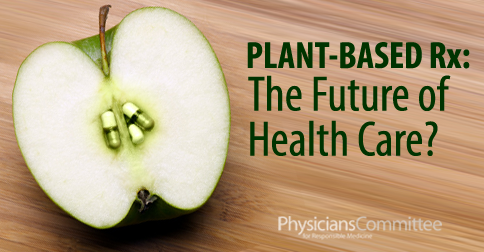Plant-Based Rx: The Future of Health Care?

Healthful plant-based diets are no longer just a fad or a secret regimen of Hollywood stars. They are now everywhere. From Beyoncé, Jay-Z, and Carrie Underwood, to Kim Williams, M.D., the president of the American College of Cardiology, we continue to hear success stories that inspire fans and patients to follow suit. From a medical standpoint, study after study shows this approach helps people lose weight, lower blood pressure, improve cholesterol, and stabilize blood sugar. If a pill could do all these things, it would become a blockbuster drug overnight. So why aren’t more physicians prescribing a trip to the grocery store—especially if all the side effects of a dietary intervention are positive? The truth is, less than 25 percent of doctors talk to their patients about the link between disease prevention and diet, nutrition, and exercise. It’s no wonder that nearly 70 percent of our population has at least one metabolic risk factor for heart disease, the leading cause of death in the United States. Doctors don’t need a degree in nutrition to help patients improve their diets. Spending just five minutes talking to patients about the importance of moving plant-based fare—vegetables, fruits, whole grains, and legumes—to the center of the plate can yield significant results. Here are four tips to get started:
- Ask your patients if they are aware about the value of a plant-based diet.
- Recommend resources where they can learn more. Several leading medical organizations now have consumer-friendly guides for plant-based nutrition.
- Schedule a follow-up visit to a dietitian, nutritionist, or weekly cooking class. Meet again in four to six weeks to assess results.
- Track biometric risk factors and praise any sign of progress, large or small.
Hosting a weekly after-hours nutrition education class in your office is another effective way to establish a built-in-support system for patients. One instructor—a nurse, dietitian, doctor, or health coach—can teach 15-20 people. It is a model of efficiency! As more physicians adopt this approach, and as the government integrates a plant-based prescription into its next set of dietary guidelines, slashing dangerous fats and excess sodium along the way, the question reverberating out of exam rooms will likely be “How soon can I get started?” As health care providers our job is to plant the seed. Want to learn more about plant-based nutrition and preventive medicine? Test-drive the 21-Day Vegan Kickstart. Physicians can also attend this summer’s International Conference on Nutrition in Medicine: Cardiovascular Disease, which will feature a panel of health care professionals discussing how to implement nutrition conversations into clinical practice.








